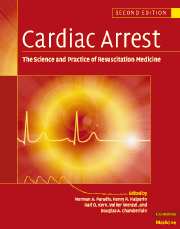Book contents
- Frontmatter
- Contents
- List of contributors
- Foreword
- Preface
- Part I Introduction
- Part II Basic science
- 3 Global cellular ischemia/reperfusion during cardiac arrest: critical stress responses and the postresuscitation syndrome
- 4 Genetics, genomics and proteomics in sudden cardiac death
- 5 Intracellular signaling during myocardial ischemia
- 6 Electrophysiology of ventricular fibrillation and defibrillation
- 7 The neuroendocrine response to global ischemia and reperfusion
- 8 Inflammatory and Immunologic responses to ischemia and reperfusion
- 9 Methodology of laboratory resuscitation research
- 10 The methodology of clinical resuscitation research
- 11 The special problem of consent for resuscitation research
- Part III The pathophysiology of global ischemia and reperfusion
- Part IV Therapy of sudden death
- Part V Postresuscitation disease and its care
- Part VI Special resuscitation circumstances
- Part VII Special issues in resuscitation
- Index
3 - Global cellular ischemia/reperfusion during cardiac arrest: critical stress responses and the postresuscitation syndrome
from Part II - Basic science
Published online by Cambridge University Press: 06 January 2010
- Frontmatter
- Contents
- List of contributors
- Foreword
- Preface
- Part I Introduction
- Part II Basic science
- 3 Global cellular ischemia/reperfusion during cardiac arrest: critical stress responses and the postresuscitation syndrome
- 4 Genetics, genomics and proteomics in sudden cardiac death
- 5 Intracellular signaling during myocardial ischemia
- 6 Electrophysiology of ventricular fibrillation and defibrillation
- 7 The neuroendocrine response to global ischemia and reperfusion
- 8 Inflammatory and Immunologic responses to ischemia and reperfusion
- 9 Methodology of laboratory resuscitation research
- 10 The methodology of clinical resuscitation research
- 11 The special problem of consent for resuscitation research
- Part III The pathophysiology of global ischemia and reperfusion
- Part IV Therapy of sudden death
- Part V Postresuscitation disease and its care
- Part VI Special resuscitation circumstances
- Part VII Special issues in resuscitation
- Index
Summary
Cardiac arrest is the most lethal disease of ischemia/reperfusion (I/R) with only 5%–7% of out-of-hospital cardiac arrest (OHCA) victims surviving to hospital discharge. Why a patient passes from full human function to “death” within minutes to hours, often despite an initially successful resuscitation and restoration of normal vital signs, is unclear. Certainly compared with the focal tissue ischemia of stroke or myocardial infarction the ischemic interval of cardiac arrest is measured in minutes rather than hours; yet, the establishment of reperfusion following cardiac arrest resuscitation, unlike that following focal ischemia, cannot be considered definitive therapy. Indeed, out of every 100 cardiac arrest victims, about 30 will achieve return of spontaneous circulation (ROSC) but only 5 survive the postresuscitation period to hospital discharge. Thus, postresuscitation deaths contribute significantly to overall out-of-hospital cardiac arrest mortality as most patients who are initially “saved” die during a lethal post-resuscitation syndrome often during the first 24–72 hours, characterized by early cardiovascular collapse with multi-organ failure and subsequent failure of central nervous system recovery. If we could successfully treat or prevent reperfusion injury it would result in an estimated 6–10 fold improvement in survival following cardiac arrest. Efforts to improve post-resuscitation care are well justified since 75% of patients who are discharged alive return to their communities with intact neurological function and a good quality of life.
The extent of such post-resuscitation injury is likely to be associated with the time of ischemia. Weisfeldt and Becker proposed a “three-phase time-sensitive” model of cardiac arrest highlighting the need for different treatments at specific ischemia times of cardiac arrest.
- Type
- Chapter
- Information
- Cardiac ArrestThe Science and Practice of Resuscitation Medicine, pp. 51 - 69Publisher: Cambridge University PressPrint publication year: 2007
- 1
- Cited by



